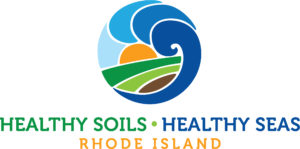
The Healthy Soils Healthy Seas Rhode Island (HSHSRI) multi-year initiative inspires and empowers our community to make transformative behavior changes to improve ocean health. HSHSRI uses the multifaceted behavior of composting as an integrative solution for waste management, water quality, marine debris and overall ocean health for the state of Rhode Island.
Now in the fourth year of the program, our main objectives include: educating residents about the importance of food scrap diversion and how to start composting at home; expanding our school lunchroom composting program to 10 schools; advancing local and statewide policies that mandate commercial and residential organics separation and processing, and expanding our event sustainability service model.
Education & Outreach

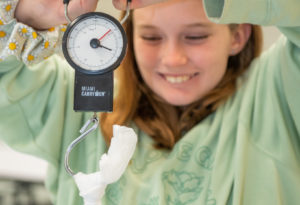




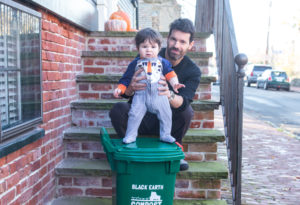

According to the USDA’s National School Lunch Program, roughly $5 million is wasted on edible food each year, and a recent World Wildlife Fund study about Food Waste in schools estimated that 530,000 tons of food is wasted in school cafeterias each year. Our lunchroom composting program aims to foster environmentally responsible behaviors by introducing and establishing a lunchroom waste management program that sorts waste into bins for compost, recycling, and landfill. The program will bring awareness to single-use disposable materials and leftover or uneaten foods; providing an opportunity for discussion about using more durable reusable materials and reducing leftover food. At this time, we can provide public schools with a monetary stipend to jumpstart their lunchroom composting programs, with the goal that composting and recycling will become a standard part of waste management costs in the future. In order to make this program successful, we are looking for student and faculty support, as students are instrumental for implementing the program and faculty can help with the program’s longevity. If you would like to see your school start composting today, please fill out the form at the top of the page!
To increase awareness about the importance of diverting food scraps from our landfill and the environmental benefits of using finished compost, we provide informational presentations to community groups, such as garden clubs, rotary clubs, neighborhood associations, housing authorities, religious groups, municipal committees, or commissions. These presentations talk about the circular economy of composting, thinking about composting as a waste management solution, the environmental benefits of compost and various ways to start composting at home depending on the community that you live in. If you are interested in COA giving a presentation in your community, please fill out the form at the top of the page!
Start Composting at Home Today!
The diversion of food scraps from the waste stream in your home is a behavior change that allows residents to reduce waste, reduce greenhouse gas emissions, and improve soil health. Learn how you can get started at home below!
|
Curbside Composting Pick-up Service |
Backyard Composting |
Vermiculture |
|
Fill your curbside container with compostable items, bring it out to the curb, and have a compost hauling service pick it up and process it for you. |
Create a compost pile in your backyard with your food scraps and leaf/yard waste. Continuously turn the pile and in a few months you’ll have usable compost for your garden or lawns. |
Use the power of red-wiggler worms to compost your vegetable scraps! |
|
How to sign up? Check to see if Black Earth Compost or Bootstrap Compost services your community! When you sign up for a service through Black Earth you receive your starter kit (bin & liners) for free through HSHSRI! |
How to Sign up? Check with your city or town to see if they sell discounted backyard bins or purchase a bin from Rhode Island Resource Recovery Corporation or build your own bin. |
How to Sign up? Purchase a Vermiculutre bin from Bootstrap Compost or make your own. |
We are seeking community scientists to weigh and report data on the trash, recycling, and compost generated in their homes. This data is used to create a more robust representation of the residential composting community across RI. COA also sees this as an opportunity to learn more about residential waste footprints that are not currently captured in the Rhode Island Resource Recovery’s reporting about residential waste for the state. The data collected by our community scientists will be incorporated into an open-source dataset that will be available on our new Healthy Soils Healthy Seas website coming in 2023! All community scientists will receive a hanging scale, a countertop compost container, and training on how to properly weigh and report data. At the end of a three month time period, each community scientist will receive a certificate of completion and a COA merch item. If you are interested in becoming a community scientist, please visit our get involved page.
Event Sustainability
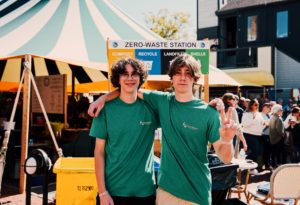


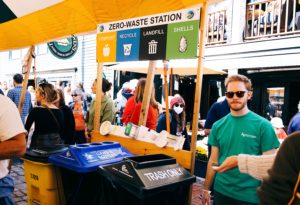

Over the last three years, COA has led sustainability efforts for many large-scale community events in Newport, introducing comprehensive waste management strategies for our partners to easily divert waste from the state’s landfill. These events include: newportFILM Outdoors movie series, Bowen’s Wharf Oyster & Chowder Festival and Seafood Festival, Broadway Street Fair, Norman Bird Sanctuary Harvest Fair, and the International Tennis Hall of Fame Tennis Open.
We are officially launching an event sustainability consulting service, where we will work with your business or organization to plan, coordinate and execute sustainability protocols at your event. No need to sweat knowing the latest and greatest green policies and procedures, we’ve got you covered! We’ll start by defining multi-year sustainability goals and work with you to find the best strategies and products to achieve these goals. If you are interested in learning more about our services, please fill out our form at the top of the page! We are now booking for 2023.
Advocacy
Become a compost champion!
As we move from growing awareness about composting, to making an impact and enacting change, our advocacy efforts become a more central part to the HSHSRI program. Our advocacy goals this year focus on:
- Continuing to support statewide legislation that further modifies or mandates policies that require organics separation at commercial levels and encourages processing of organic materials in RI via farms, anaerobic digesters, or in-vessel machines
- Advancing conversations at the municipal levels to require or mandate composting for residents in a RI municipality
- Advancing school lunchroom composting efforts by working with school committees, commissions, and town/city councils in order to ensure the financial sustainability of the programs.
The voice of our community members is vital in supporting these policy changes. If you are interested in seeing your community explore a municipal-level composting program or want to help to advocate for more residents to start composting in your neighborhood or community, please fill out our form at the top of the page!

